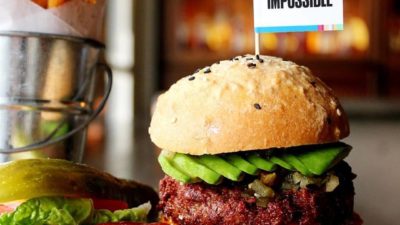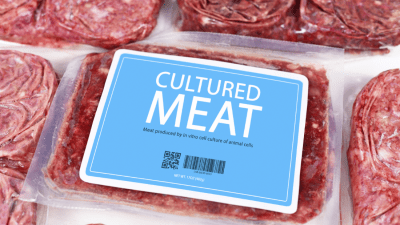It’s Meat Jim, But Not as We Know It!

Why the Meat-Alternative Food Revolution is Unstoppable and why British billionaire, Jim Mellon, is in!
Featured in Viva!Life 77/Summer 2021
Cultured meat recently made its historic debut in Singapore. Eat Just, a US start-up company, launched the lab-grown chicken at a chic restaurant, 1880. It is the first in the world to make cultured meat commercially available and its brand, GOOD Meat, was used in three dishes: bao bun with crispy sesame cultured chicken and spring onion; phyllo puff pastry with cultured chicken and black bean puree; and a crispy maple waffle with cultured chicken with spices and hot sauce.
Josh Tetrick, co-founder and CEO of Eat Just told Viva!life: “This historic step, the first-ever commercial sale of cultured meat, moves us closer to a world where the majority of meat we eat will not require tearing down a single forest, displacing a single animal’s habitat or using a single drop of antibiotics.”
Most the CEOs I’ve contacted in the cultured meat arena are similarly motivated by their ethics. My interest in cultured meat is, of course, for the animals. Seventy five billion farmed animals were killed last year across the globe and most were intensively farmed in pitiable conditions. Feeding these poor creatures is ravaging the world’s wildernesses, as they are ripped up to make way for grazing and animal fodder. Animals from the sea fare no better with almost all salmon factory farmed and trillions of other fish wrenched from the oceans, which are ecologically collapsing.
With meat consumption growing in China and India, it’s an incredibly long lever to pull to quickly reduce the numbers of animals slaughtered worldwide. Cultured meat may be the only way to dramatically reduce the number of animals – and I mean by tens of billions – in our lifetime.
With these thoughts in mind, I attended a webinar Protein Reimagined: Transforming the Global Food System, run by the Good Food Institute in Spring 2021, which was revealing. Within six years, the number of cultured meat companies has grown from just two to over 60 across the world. With investments of over $450 million they have made huge strides in commercialising not only cultured meat but also fish, prawns and shrimp, foie gras, dairy products (including infant formula), pet food and leather. As the Founder of Vitro Labs, Ingvar Helgason, told me “a single painless biopsy from one cow can make millions of handbags.”
Curious to discover how cultured meat is made, I visited Mosa Meat in Maastrict. This was the company co-founded by Dutch scientist Mark Post who unveiled the first cultivated meat burger on live television in London in 2013. A tiny sample of cells are painlessly taken from an animal. These cells are fed a broth of nutrients, growth factors and water. They multiply and trillions more grow. From there, the cells are grown into meat (or other products) using a bioreactor. From start to finish, the process by Eat Just for chicken takes about 14 days. Other companies take up to two months to produce the final product.
One of the stumbling blocks to producing cultured meat, was that the medium traditionally used to grow the animal cells, foetal bovine serum or FBS, contained serum taken from the hearts of live calf foetuses – yes, it is as horrifically cruel as it sounds.
However, Mosa Meat have announced that they have developed medium that does not contain any animal components and Didier Toubia, co-founder at Aleph Farms in Israel wrote in an email to me “our growth medium does not include any component obtained from animals”. Other companies have achieved this too.
Who is investing in cultured meats and is it really going to trigger a new Agrarian Revolution? To find out I wanted to meet someone who truly understands the world of investment and cultured meats and who better than British billionaire, Jim Mellon? Jim gained his masters degree in Politics, Philosophy and Economics from Oxford; trained as an investment manager and was a multi-millionaire by the age of 28. He has set up Agronomics Ltd, an investment company focussed on cultured animal products which is the only way non-rich folk can invest in this sector. I had heard him speak on the urgent need of food reform and firstly wanted to find out what was motivating him to turn his attention to cultured meats? We set up a zoom and he told me:
“I’m involved in the biotech industry. My partners and I have created a number of biotech companies for human health. The process by which cell ag. products are produced is largely a biotech process. I could see that there was a buzz around the cell ag. area that was beginning to really get traction. I looked at the reasons behind it and decided to dive in.” But what were those reasons? Jim was refreshingly outspoken: “The number one is the reduction in the abhorrent industrial slaughter of animals that are very badly treated. This is something that I think you and I completely relate to and it is my number one motivating factor.”
I’ve seen Jim speak against factory farming – he is passionate, persuasive and articulate. Was there a lightbulb moment?
“No, it was just a gradual realisation that sentient beings are being slaughtered in really abjectly awful conditions without most of us knowing about that and eating the products of the, in many cases, distended and artificially produced bodies. I just couldn’t abide it anymore and gave up. I have to admit that it’s a relatively recent conversion, six years now, no meat here. I intend to do what I can to raise my voice for that. That’s my number one motivation.”
The second?
“Food security. Neither of us were around in the Second World War but we all know about the convoys and the near-starvation of the British population because of the sinking of the ships and the fact that Britain imported, at that stage, 40 per cent of its food. Now it’s half. We really need to do something about improving food security in increasingly uncertain times and we really need to improve the quality of food so we don’t run the pandemic risks that Viva! quite rightly identified in its 3 in 4 campaign. There are places in the world which are much more food insecure than the UK. The Middle East, where I’ve spent quite a lot of time, is a very good example. They import nearly 100% of their food. Singapore is another example of that. Hong Kong. The sort of countries which don’t have any agriculture. This is going to be a big driving force to grow the cultured meat sector and it’s a motivating factor for me as well.”
“The number three factor is, of course, the environment. I can’t understand anyone who denies climate change but there are such people. The fact of the matter is that in every respect, food that’s being produced both by the plant-based companies and by the cell ag. companies, is so much better for the planet. It’s not even comparable. There is no excuse for the intensive farming of animals. None. It will probably go on for the next 20 or 30 years, it’s on a declining trajectory.
“The heartening thing is the alternative meat market. Ten years ago in the United States only 0.5% of the market was alternative dairy products. Today it’s over one fifth, heading to one quarter this year. The big dairy companies, which are also despicable abusers of animals, have gone bust in the United States. And that’s before the products from Perfect Day or Noquo are launched! They are basically precision fermented products that replicate whey and casein and are identical in taste and texture to cow’s milk. I think that industry has gone. I think the dairy product industry as it currently exists is a complete bummer, and it’s 750 billion dollars around the word, so it’s a big one!
“Then, on fish, the destruction of the oceans is appalling and frightening. But we now have products that are identical to fish species without the fish being slaughtered and without the mercury and PCB’s. I do think BlueNalu [the global leader in developing cell-cultured seafood] has the capacity within five years to be the world’s biggest producer of seafood.”
Jim’s company, Agronomic, has chosen 16 of the cultured meat, fish, dairy and leather products that perform well and show most future promise. He states that all of them use growth serums without any animal products. His new book, Moo’s Law gives a guide to the new (they are all new!) cell ag. companies and lists the top 25. Jim has privileged access to industry leaders giving a rare insight to this radical new space.
The book is fascinating – with an insider’s guide to how cell cultured products are produced – information I haven’t found in this detail elsewhere. It has many snippets of interesting information such as cultured meat pet food is already being sold in the USA on subscription from Wild Earth, who point out that almost 500 million pet dogs and 370 million pet cats worldwide are largely being fed factory farmed meat. Or that Mosa Meat raised EUR 55 million in series B to launch cultured cell minced beef in 2025 and later, steaks. Mosa plans to produce two million tons of beef per annum by 2030, which will save 10 million cows. It will also stop the production of 70 million tons of carbon dioxide, free up 19 million hectares of arable land and reduce water usage by 25 gigalitres. You get the point!
Why is Jim’s book called Moo’s Law? It is a play on Moore’s Law which states that the number of transistors on a microchip doubles about every two years, though the cost of computers is halved. In 1965, Gordon E. Moore, the co-founder of Intel, made this observation that became Moore’s Law. Jim enthuses:
“It’s almost like a trajectory law. It’s a super charge that never deviates. I thought this will be the same for our industry, as time goes on the scale goes up, the price comes down and this is unstoppable. It’s why I called it Moo’s Law. I also use the phrase ‘griddle parity’, because in energy grid parity is when the price of solar and wind power, and other renewables comes down to the level of fossil fuel produced power. Griddle parity is when the price of the alternative meat, fish and dairy foods come down to the price of conventionally intensively farmed food. With plant-based alternatives it’s going to be by the end of this year. In cultured cell ag. we are looking at about five years.”
The truth is veganism is exploding in the UK and Europe, and parts of the USA and Australia. The global plant-based protein market is set to reach $25 billion by 2025. Forty per cent of the global food giants have launched plant-based products, including JBS, Cargill and Nestle. Entrepreneurs are launching successful plant-based food companies like there’s no tomorrow – Oggs (using egg alternative aqua faba) going from concept to sales across UK supermarkets within three years! Within six months of its UK launch in 2019, THIS (soya and pea based meats) had an annualised revenue of £3 million. The company reports a compound growth rate of 35 per cent month over month, and its products appear in over 1200 stores and chains around the UK. It is predicted by the food industry that cultured meat will co-exist with plant-based meat, fish and dairy giving consumers a greater choice – particularly as 75 per cent of Gen Z (16 to 25 year olds) are reducing their meat consumption.
Make no mistake – vegans are crucial to this growth. Punching above our weight, we have driven the food revolution. Viva! – against many odds – was the first to campaign hard in Britain and Poland on vegan issues. To educate the public on how animals are farmed in devastatingly appalling conditions and killed against their will.
Despite the now rapid change, it isn’t fast enough. There is a significant meat eating contingent who will not change quickly enough and for them cultured meat may be a solution. From a pragmatic stance and looking through the eyes of a farmed animal – it is better for all earthlings if cultured meat, using a vegan medium replaces animal slaughter.
We all desperately need the human race to stop ravaging our world. Central to a behavioural shift is veganism – the understanding that the exploitation of animals causes untold damage and pain. As peoples’ hearts and minds are changed, the growth of vegan foods and cultured meats will work in parallel to ensure that our crumbling world, riddled with the horrors of factory farming and slaughter, evolves into a vibrant world where we protect and celebrate life. Our motto could be ‘Viva! life’.
Moo’s Law is available from Amazon for £10.50, paperback. More information from mooslawbook.com







